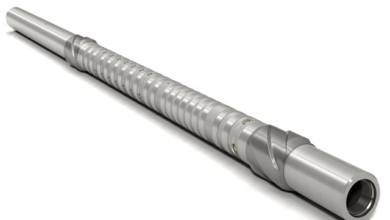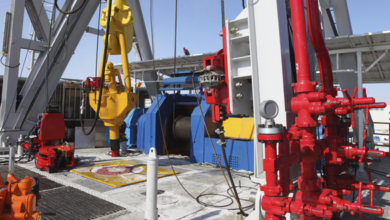John Beswick, PR Marriott Drilling: Politics could hinder Euro-shale potential

By Katherine Scott, associate editor
John Beswick, director of PR Marriott Drilling, grew up wanting to be a pilot. “I was always destined for a career in the Royal Air Force,” he said. “It was my eyesight that eventually stopped me from being a flyer.” But nothing would prevent Mr Beswick from finding his own success, which he defines as being open to change. “You have to get up and pick yourself up. I’m used to starting again and looking at things from various perspectives. I’m quite flexible.”
With his piloting dreams dashed, Mr Beswick instead earned a civil engineering degree from Loughborough University in England in 1963 and later a postgraduate degree in engineering geology from London’s Imperial College, after which he worked on various operations in civil engineering and geology, as well as in geothermal research, before finally making his way to Kenting, a Canadian drilling contractor, in 1986. Thus he began his work in oil and gas industry, where he has managed operations worldwide for the last 26 years.
In his current part-time role with UK-based Marriott Drilling, Mr Beswick is helping grow the company from a small family operation into a medium-size group. “I’m like a coach more than anything,” he said. “I’ve been trying to change the style, the way we operate, the quality and the health and safety culture to bring it up to a the highest standards of the industry. Marriott has now become a highly respected company with both domestic and international operations.” Mr Beswick had just retired in 2007 when he received a call from Marriott. “They had been trying to get me to join for a while, and I said, ‘When I retire and I’ve got nothing else on my desk, if you’re still interested, I might think about it.’ The day I retired, I got a call,” he recalled. “It’s been quite an interesting story in my twilight years as I was attracted to Marriott as it is different sort of company with a family tradition, strong values and ambition.”
As a member of the International Association of Oil and Gas Producers (OGP) Gas Communications Task Force in Brussels, Mr Beswick has been representing IADC with the group since April 2011. The task force, predominately made up of operators, compiles reports and disseminates material to the general public and European ministers as a way to tackle shale gas misinformation. Having been previously involved with IADC’s government affairs, Mr Beswick supplies an expertise that extends beyond drilling and said that there has been positive support for IADC’s place at the table. “We’re really trying to be responsible citizens,” he said.
While shale gas development is in its infancy in Europe, Mr Beswick noted that industry hopes are high in many countries, as long as they can get past the exploration phase. “Until we’ve actually drilled and fractured and produced gas, we can’t make any statements about how good it is, but overall, it has the potential to provide Europe with a good resource for many years. We just have to get over the politics.”
One problem, he said, lies in the way industry describes shale gas. “Why did we have to call this ‘unconventional’ gas?” he asked. “If the word ‘unconventional’ was left out of it, we wouldn’t have half the trouble. But, because we used this word, the general public thinks this is something new, like, ‘Ah ha! It’s radioactive waste.’” It’s up to the industry to disseminate the facts, he said. “We’ve got to change the hearts and minds of people to believe this is not a bad thing.”
Industry should also focus on attracting more young people and “giving them a wider experience,” Mr Beswick said. “A lot of people are coming up now that may be good at one thing, but they don’t have the broad general knowledge of the industry.” The best way to resolve this issue, he feels, is to share experience. “Sharing works both ways; the young people benefit from the ideas you might throw around and the older people keep up to date with the way the young think.” And the reward is indescribable, as Mr Beswick reflects that one of the best parts of his career in this industry is “looking back through the years and seeing you’ve helped a lot of young people.”
Likewise, it’s important to be a team player, he continued. He likens industry collaboration to football. “We have an international standard; the markings of the lines are the same, we have the same number of players, and every position has to do their bit,” he said. “It’s only when they work together every match that they succeed and become champions. And that’s the idea of being a team player.”
While Mr Beswick, who visited the White House in summer 1959 as a guest of the US Air Force, having been a member of the International Air Cadet Exchange, once had other career plans, he feels he ended up where he belongs. “I enjoy the technical side and the new challenges. There’s always an awful lot to do in this industry because we continue to discover better ways to do things.”




Will report on return